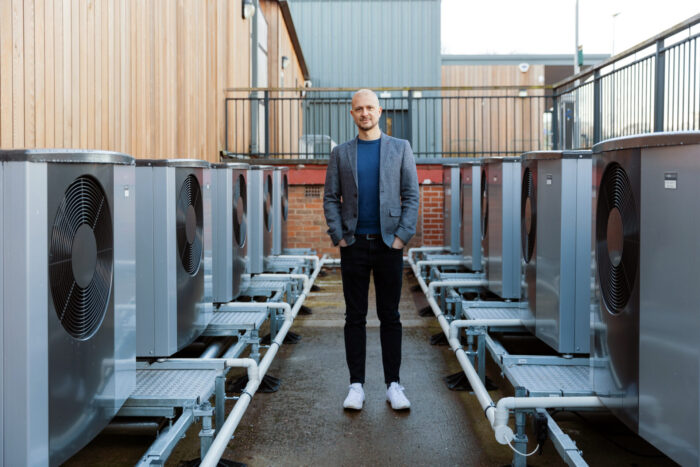Sustaining Momentum: Pioneering Relational Retrofit
For Professor Mark Davis ESRC IAA funding was crucial to sustain the momentum, relationships and development of his work in co-creating a relational approach to retrofit
Reframing the narrative around retrofitting
Initially, Professor Mark Davis, Deputy Head (Strategy) in the School of Sociology and Social Policy, and his colleague Professor Lucie Middlemiss (School of Earth and Environment) led a UK-wide team (funded by UKERC) looking at the installation of energy efficiency measures in domestic buildings. “For the UK to meet its net zero targets, we need to decarbonise homes,” Mark explains. “We can’t simply ‘build our way out’ of the problem; instead, we need to retrofit existing homes through solar PV, low-carbon heating, ventilation and cooling through heat pumps and insulation technology. Yet we found retrofit rates are incredibly slow, largely because customers are left to navigate the decarbonisation journey alone.
“Policymakers lack a real understanding of the relational factors behind decision-making. Therefore, households are not getting the right support to find out what they can do. We wanted to address how to establish trust amongst companies, trades, financial providers, homeowners and others involved in navigating these often place-based decisions.”

Professor Mark Davis standing next to heat pumps at the Brownlee Centre which are helping the university to achieve its net zero targets by 2030
Demonstrating necessity for further funding
Soon, the national government Department for Energy Security & Net Zero (DESNZ) retrofit team got in touch with Mark and his colleagues, asking for help. “They’d found and read one of our academic papers, led by Dr Anne Owen (School of Earth and Environment), which we know is a rare thing!” says Mark. “They liked what we’d published and wanted to work with us; naturally, we were keen to keep up momentum. But our funding had run out.”
Mark approached Leeds Social Sciences Institute (LSSI) to ask about the ESRC IAA grant. “We’d already spoken with LSSI about the decarbonisation policy and its social impact,” he adds. “Now, we explained that we wanted to apply for the funding to employ a research assistant to lead workshops, run initial research, and build relationships with key contacts.”
Adapting to change and strengthening relationships
When Mark’s key partner, Leeds City Council, adjusted its direction in the delivery of a Retrofit Accelerator Hub, Mark’s project pivoted – though the value of and need for its core concepts remained. “Our project unexpectedly changed path. Yet when we explained this to LSSI, they were brilliant – and still clearly saw there was so much we could do with the funding. It further proved the premise of the work we’d been doing, in that so much of our relational sociology of retrofit work is about building strong relationships,” he explains.
We’ve also been able to demonstrate the importance of professional development for Early Career Researchers (ECRs). ESRC IAA funding allowed us to employ Dr Ruth Bookbinder as a post-doc fellow for six months. In fact, the Further Together initiative on campus showcased the work we did to support ECRs. Helping the next generation of scholars is always embedded in the work we do and is something of huge importance.
Cementing a position as local leaders in the retrofit space
Through the project, Mark and his colleagues could scale up what began in Leeds. “We’re now at the point of launching a series of innovation workshops with three combined Yorkshire authorities and Lloyds Bank to look at what the model we’ve created means when applied across the region,” Mark says. “Using our research, these authorities are now looking at this problem in terms of relational factors, like building trust with trades and new technology to meet real energy needs. As such, they’re shifting away from the idea that retrofit decisions are based only on a pretty crude financial calculation of ‘cost versus benefit’.”
“We’ve carved a real niche as the ones who’ve driven forward this relational approach to retrofit. We’ve set up a new research group at the university – the Leeds Relational Energy Group – and become the go-to people for looking at changing the ways we approach the retrofit challenge in the UK, starting in Leeds.”
The IAA supports a portfolio of activities and resources across the social science community which will maximise the potential for impact of social science research and contribute to economic and societal development regionally, nationally, and internationally. To find out more about LSSI IAA funding please visit our dedicated webpage.
